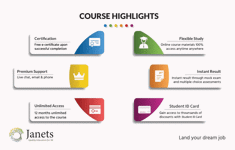Travel Blogger: Ethical and Legal Aspects of Blogging
CPD Certified Diploma | FREE Exam | 24/7 Tutor Support | Lifetime Access | 100% Success Rate
Janets
Summary
- Certificate of completion - £9.99
- Certificate of completion - £15.99
- Exam(s) / assessment(s) is included in price
- Tutor is available to students
Add to basket or enquire
Overview
In the UK, travel bloggers can earn a diverse range of income, with top bloggers earning up to £50,000 annually or more, depending on their reach and monetisation strategies. Our Travel Blogger: Ethical and Legal Aspects of Blogging course offers an in-depth understanding of the essential components of successful and responsible travel blogging. As the world of travel continues to flourish, the demand for engaging and informative content grows, presenting an opportunity to excel in this exciting field.
Our comprehensive curriculum includes 13 modules covering topics such as ethical and legal aspects of blogging, travel story writing, setting up your blog, photography, branding, SEO, and building an email list. Dive into social media marketing, generating income through advertising, affiliate partnering, sponsored posts, paid press trips, and more. Learn how to pitch for travel blogging work and maximise your income potential.
Enrol in our Travel Blogger course to embark on an exciting and financially rewarding career. Learn the aptitude and tactics to flourish in ethical travel blogging. Explore the world while sharing your experiences with a captive audience, inspiring others to follow in your footsteps.
Learning outcomes:
- Acquire a thorough understanding of blogging and its ethical and legal aspects
- Familiarise yourself with the role and responsibilities of a travel blogger
- Develop engaging travel stories and compelling content
- Master the process of setting up and managing your travel blog
- Enhance your travel blogging with captivating photography
- Learn branding, SEO, and email list-building techniques
- Explore social media marketing strategies tailored for travel bloggers
- Understand income generation through advertising, affiliate partnering, sponsored posts, and paid press trips
Certificates
Certificate of completion
Digital certificate - £9.99
Receive a digital copy of your certificate as a PDF file for only £9.99.
Certificate of completion
Hard copy certificate - £15.99
A physical, high-quality copy of your certificate will be printed and mailed to you for only £15.99.
For students within the United Kingdom, there will be no additional charge for postage and packaging. For students outside the United Kingdom, there will be an additional £10 fee for international shipping.
CPD
Course media
Description
Our Travel Blogger: Ethical and Legal Aspects of Blogging course provides an in-depth exploration of the essential components required to create a successful and responsible travel blog. Gain insights into the ethical and legal aspects of blogging, learn to write captivating travel stories, and explore various monetisation strategies.
Develop a comprehensive skill set, including travel photography, branding, SEO, email list building, and social media marketing. This course equips you with the knowledge and tools needed to excel in the exciting and rewarding world of travel blogging.
Who is this course for?
- Aspiring travel bloggers
- Experienced bloggers seeking to improve their skills
- Content creators looking to diversify their income streams
- Travel enthusiasts who want to share their experiences
- Social media influencers interested in travel blogging
- Digital marketers looking to specialise in the travel niche
Career path
- Full-time Travel Blogger: £15,000 - £50,000+ per year
- Freelance Travel Writer: £15,000 - £40,000+ per year
- Content Creator: £20,000 - £40,000 per year
- Social Media Manager (travel niche): £25,000 - £45,000 per year
- Digital Marketing Specialist (travel niche): £25,000 - £50,000 per year
- Travel Photographer: £20,000 - £50,000+ per year
- SEO Specialist (travel niche): £25,000 - £50,000 per year
Questions and answers
Currently there are no Q&As for this course. Be the first to ask a question.
Reviews
Currently there are no reviews for this course. Be the first to leave a review.
Legal information
This course is advertised on reed.co.uk by the Course Provider, whose terms and conditions apply. Purchases are made directly from the Course Provider, and as such, content and materials are supplied by the Course Provider directly. Reed is acting as agent and not reseller in relation to this course. Reed's only responsibility is to facilitate your payment for the course. It is your responsibility to review and agree to the Course Provider's terms and conditions and satisfy yourself as to the suitability of the course you intend to purchase. Reed will not have any responsibility for the content of the course and/or associated materials.




